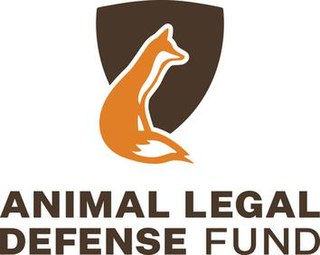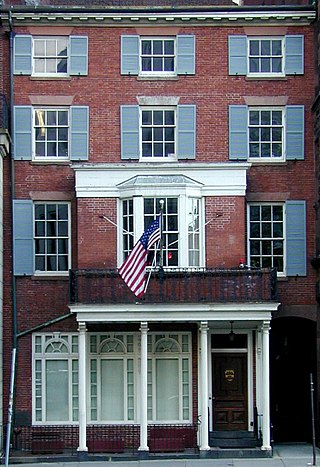Gideon v. Wainwright, 372 U.S. 335 (1963), was a landmark U.S. Supreme Court decision in which the Court ruled that the Sixth Amendment of the U.S. Constitution requires U.S. states to provide attorneys to criminal defendants who are unable to afford their own. The case extended the right to counsel, which had been found under the Fifth and Sixth Amendments to impose requirements on the federal government, by imposing those requirements upon the states as well.

Criminal justice is the delivery of justice to those who have been accused of committing crimes. The criminal justice system is a series of government agencies and institutions. Goals include the rehabilitation of offenders, preventing other crimes, and moral support for victims. The primary institutions of the criminal justice system are the police, prosecution and defense lawyers, the courts and the prisons system.
An amicus curiae is an individual or organization who is not a party to a legal case, but who is permitted to assist a court by offering information, expertise, or insight that has a bearing on the issues in the case. The decision on whether to consider an amicus brief lies within the discretion of the court. The phrase is legal Latin and the origin of the term has been dated to 1605–1615. The scope of amici curiae is generally found in the cases where broad public interests are involved and concerns regarding civil rights are in question.

Together, legal psychology and forensic psychology form the field more generally recognized as "psychology and law". Following earlier efforts by psychologists to address legal issues, psychology and law became a field of study in the 1960s as part of an effort to enhance justice, though that originating concern has lessened over time. The multidisciplinary American Psychological Association's Division 41, the American Psychology–Law Society, is active with the goal of promoting the contributions of psychology to the understanding of law and legal systems through research, as well as providing education to psychologists in legal issues and providing education to legal personnel on psychological issues. Further, its mandate is to inform the psychological and legal communities and the public at large of current research, educational, and service in the area of psychology and law. There are similar societies in Britain and Europe.

The Association of the Bar of the City of New York, commonly referred to as the New York City Bar Association, founded in 1870, is a voluntary association of lawyers and law students. Since 1896, the organization has been headquartered in a landmark building on 44th Street, between Fifth and Sixth Avenues in Manhattan. Today the City Bar has more than 23,000 members. Its current president, Susan J. Kohlmann, began her two-year term in May 2022.

The Animal Legal Defense Fund is an animal law advocacy organization. Its stated mission is to protect the lives and advance the interests of animals through the legal system. It accomplishes this by filing high-impact lawsuits to protect animals from harm, providing free legal assistance and training to prosecutors to assure that animal abusers are punished for their crimes, supporting tough animal protection legislation and fighting legislation harmful to animals, and providing resources and opportunities to law students and professionals to advance the emerging field of animal law. In addition to their national headquarters in Cotati, California, the Animal Legal Defense Fund maintains an office in Portland, Oregon.

Jeralyn Elise Merritt is an American criminal defense attorney in private practice in Denver, Colorado, since 1974. She served as one of the trial lawyers for Timothy McVeigh in the Oklahoma City bombing case in 1996 and 1997. In 2002 Merritt founded and is the principal author of the blog TalkLeft: The Politics of Crime. She also serves as a legal commentator for news media programs and as an internet journalist.

Sholom Mordechai Rubashkin was a convicted felon and the former CEO of Agriprocessors, a now-bankrupt kosher slaughterhouse and meat packing plant in Postville, Iowa, formerly owned by his father, Aaron Rubashkin. During his time as CEO of the plant, Agriprocessors grew into one of the nation's largest kosher meat producers, but was also cited for issues involving animal cruelty, food safety, environmental safety, child labor, and hiring undocumented immigrants.

The Boston Bar Association (BBA) is a volunteer non-governmental organization in Boston, Massachusetts, United States. With headquarters located at 16 Beacon Street in the historic Chester Harding House, across from the Massachusetts State House on Beacon Hill, the BBA has 13,000 members drawn from private practice, corporations, government agencies, legal aid organizations, the courts and law schools.
The Community Rights Counsel was an American non-profit, public interest law firm formed in 1997 by the late Doug Kendall. Its general aim was to assist communities in protecting their health and welfare. The organization's legal work focused on the intersection of environmental and constitutional law, filing frequent amicus briefs in cases defending governmental action against claims of "regulatory takings."
Established in 1977, Atlantic Legal Foundation, also known as ALF, is a 501(c)(3) nonprofit, nonpartisan public interest law firm that litigates individual liberty, deregulation, free enterprise, and private property rights. The foundation was started to pursue a “deep commitment to redressing the bias against business which manifests itself in favor of narrow ‘consumer’ or ‘environmental’ concerns.” ALF has argued against environmental and worker regulations promulgated by federal agencies and works to promote “school-choice”. Atlantic Legal provides legal representation, without fee, to certain individuals, corporations, trade associations, parents, scientists, and educators.
James Cheney Mason is an American attorney best known as co-counsel for Casey Anthony in the 2011 Casey Anthony trial and counsel for Nelson Serrano in his 2006 murder trial.
Albert Joseph "Al" Krieger was an American criminal defense lawyer, most prominently for figures in organized crime and drug trafficking, as well as for a number of Oglala Lakota activists during criminal proceedings following the Wounded Knee Occupation.
Peter Robinson is an American lawyer who has defended political and military leaders at the United Nations International Criminal Tribunals. His clients include Bosnian Serb President Radovan Karadžić, Rwandan National Assembly President Joseph Nzirorera, Yugoslav Army Chief of Staff Dragoljub Ojdanic, and the lawyer for Liberian President Charles Taylor.
Ellen Podgor is an expert on white-collar crime and runs a white collar crime blog, which has been quoted by such blogs as The Wall Street Journal's Law Blog and the Daily Kos.
The Alaska Association of Criminal Defense Lawyers (AKACDL), founded November 30, 2009, is a voluntary non-profit professional association created to serve the needs of criminal defense attorneys in Alaska. AKACDL's primary goal is to provide continuing legal education ("CLE") for new attorneys as well as seasoned practitioners, and for both public defenders and private practitioners. AKACDL presents an annual educational event named the "AKACDL All*Stars Conference," usually featuring four nationally recognized speakers at a two-day conference held at the Alyeska Resort in Girdwood, Alaska.
In the United States, a public defender is a lawyer appointed by the courts and provided by the state or federal governments to represent and advise those who cannot afford to hire a private attorney. Public defenders are full-time attorneys employed by the state or federal governments. The public defender program is one of several types of criminal legal aid in the United States.

Daniel "Dan" Arshack is an American criminal defense attorney, co-founder of The Bronx Defenders, managing partner of the law firm Arshack, Hajek and Lehrman, PLLC, and a founding member of the International Criminal Bar, which was created to promote "the development of an independent legal profession and practice before the International Criminal Court." Arshack, who has been a defender for his entire career and "has never put anyone behind bars as either a prosecutor or government counsel," is known for his expertise on international criminal justice issues, lawyer trainings, and anti-death penalty advocacy. Arshack has conducted training for lawyers in Paris, Beirut, The Hague, Victoria, Montreal, Liberia, and New York. His specialties are trial advocacy techniques, ethics, and international criminal tribunals. He has also been an adjunct professor of trial advocacy at the Benjamin N. Cardozo School of Law in New York.
Bradley J. Bondi is an American lawyer, law professor and partner at Paul Hastings LLP, where he is Global Co-Chair of the firm's Investigations and White Collar Defense practice. He has also served on the executive staff of the Securities and Exchange Commission (SEC) and he was appointed to the Financial Crisis Inquiry Commission (FCIC) in the wake of the 2007-2008 financial crisis to investigate its causes.
In the United States, the trial penalty refers to the difference between the smaller sentence offered to a defendant in a plea bargain prior to a criminal trial versus the larger sentence the defendant could receive if they elect to go to trial. It sits at the center of a legal debate over whether trial penalties abridge defendants' Sixth Amendment right to trial.








